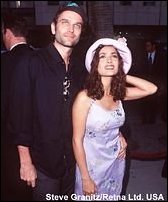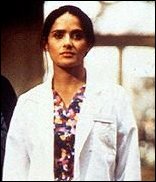Salma Hayek shoots straight about enticing tarantulas,
breaking commandments, and nearly losing Wild Wild
West
Is this the kind of gear Vampira wore when Ed Wood first
spotted her? Sporting the de rigueur bustier, black mesh
stockings, and dominatrix boots, Salma Hayek is crawling
up onto a lethal-looking metal contraption that seems
appropriate for birthing Rosemary's baby. A few yards away,
the storyboard sketches which an almost all-male crew of
50 keeps ogling show her bound and gagged on this bed of
last resort, the size D cups on her cartoon chest ready for
space travel. Also nearby, a troupe of tarantulas are waiting
for their chance to meet the curvy actress.
Has anyone mentioned that it's 1:30 a.m.?
Hayek's bodacious appearance today on Warner Bros.' Soundstage 16 is a favor to
her friend and Wild Wild West costar Will Smith. Though their $100 million-plus
summer movie (director Barry Sonnenfeld's version of the classic '60s TV series)
wrapped months ago, Smith is doing his bit to ensure an even bigger box office by
singing the title track. And Hayek agreed for free, no less to play the video's vixen.
So let's be honest: Would Smith crawl up onto a bed half-naked, ready to be bound,
his limbs spread into a human web of fear and desire, for a music video?
Sometimes a man doesn't even have to think. "I'd have to invoke my producerial
strength at that point to get in a rewrite," he laughs.
Hayek, who forages elsewhere on the Hollywood
food chain, resorts to soft diplomacy to make
herself understood. "I have arachnophobia and I'm
claustrophobic. Take your pick," she announces in
very certain terms. In other words, she'll do potential
poisoning or rough bondage, not both.
 And so twenty happy tarantulas get their SAG
cards. Jules Sylvester, a reptile and spider wrangler
from Kenya, quickly places some of the planet's
hairiest, leggiest creatures all over Hayek's nearly
naked body. The mesh stockings and virtually nonexistent bodice offer no protection, so she begs
Sylvester to set a few critters on the hard leather of her corset, just for comfort's
sake. Finally, all four cameras rolling, her considerable bosom heaves and her
five-foot-two-inch frame writhes. Suddenly, as the spiders play hide-and-seek in any
body crevice within crawling distance up her neck, down the veritable valley of her
cleavage she lets go with a William Castle scream.
And so twenty happy tarantulas get their SAG
cards. Jules Sylvester, a reptile and spider wrangler
from Kenya, quickly places some of the planet's
hairiest, leggiest creatures all over Hayek's nearly
naked body. The mesh stockings and virtually nonexistent bodice offer no protection, so she begs
Sylvester to set a few critters on the hard leather of her corset, just for comfort's
sake. Finally, all four cameras rolling, her considerable bosom heaves and her
five-foot-two-inch frame writhes. Suddenly, as the spiders play hide-and-seek in any
body crevice within crawling distance up her neck, down the veritable valley of her
cleavage she lets go with a William Castle scream.
And just think: Sonnenfeld didn't even want her for Wild Wild West.
'Salma is like Lucille Ball," says Sonnenfeld. Which doesn't exactly explain why he
put her through multiple auditions and six months of cuticle-tearing to land the
tailor-made role of Wild Wild West's femme fatale, Rita Escobar.
Why did the director of such contemporary comedy classics as Get Shorty and Men
in Black think it such a stretch for an actress from Coatzacoalcos, Mexico, to play a
Latina spitfire?
"Never, never, ever did she have an audition that convinced me it would work out,"
says Sonnenfeld. "I was really worried. You can't sit on things in comedy. The
hardest thing about comedy is making the actors speak fast enough. Faster. Faster.
Each time Salma auditioned, I was concerned whether or not she'd go where I
needed her to go."
 (Apparently Sonnenfeld hadn't heard about the actress's daredevil comic talents on
the set of last year's 54, when Hayek turned the rehearsal for costar Breckin Meyer's
first screen shag into an X-rated farce. It seems that while he was dry-humping her,
his face took on the oddest expression. A laughing Hayek whipped an oversize gold
dildo from her pants, pilfered from a Greek statue on the disco set.)
(Apparently Sonnenfeld hadn't heard about the actress's daredevil comic talents on
the set of last year's 54, when Hayek turned the rehearsal for costar Breckin Meyer's
first screen shag into an X-rated farce. It seems that while he was dry-humping her,
his face took on the oddest expression. A laughing Hayek whipped an oversize gold
dildo from her pants, pilfered from a Greek statue on the disco set.)
Smith, for his part, left all the doubting to Sonnenfeld. The actor wanted her for Wild
Wild West from the beginning, even though they'd met only once before backstage
at the 1996 MTV Movie Awards, after Hayek lost in the coveted Best Kiss category
to the Species character. ("I'm a helluva kisser, but I can't beat the tongue going
through some guy's head and killing him," she cracks.) This girl is going to be large,
he thought.
"I'm attracted to warm energy," says Smith about Hayek. "The thing about comedy
is, you have to relate to someone in order to find their comedy funny. We feel closer
to people who make us laugh. I had that with Salma."
 Sonnenfeld ultimately hired the actress on faith. Now he's saying more mea culpas
than a priest on Good Friday. "What's shocking is how well it worked out," he says.
"I thought I'd figure out how to make her funny. And then it turns out I didn't have to.
She got it right away."
Sonnenfeld ultimately hired the actress on faith. Now he's saying more mea culpas
than a priest on Good Friday. "What's shocking is how well it worked out," he says.
"I thought I'd figure out how to make her funny. And then it turns out I didn't have to.
She got it right away."
The two formed a close bond and left the set with rather, er, unique memories. "He
wants you to smell his finger right after he rubs behind his ear because it smells like
cheese," Hayek says of his unusual directorial style.
"My five-year-old, Chloe, would just want to stroke Salma's breasts and touch her
behind," Sonnenfeld says of Hayek's effect on people. "It was quite embarrassing.
Salma said that all little girls want to do that with her, because Salma is a perfect
little girl tiny, but she has breasts and a body and everything. She said we shouldn't
make Chloe feel embarrassed about wanting to spend all her time being hugged by
Salma. And the truth is, very few people don't want to spend all their time being
hugged by Salma. I was quite jealous of Chloe."
The day after her spider frightfest, Hayek emerges
from the shower of her Hollywood Hills home, all
freshly scrubbed, her wet hair pulled back. She looks
infinitely softer and about a decade younger than
movie directors would ever perceive her to be. That
she's turning the big 3-0 this September doesn't seem
to be putting a crimp in her year. "I have a maaahn
who loves me!" she cries, arms flung out to a merciful
God, referring to British actor Edward Atterton, whom
she met on the set of 1997's The Hunchback. She
also mentions the positively glorious state of her
career, albeit with somewhat less urgency. (In
addition to Wild Wild West, she recently completed
work on director Kevin Smith's Dogma, the
controversial religious satire with Ben Affleck and Matt
Damon.)
 Though she's enjoying her current high-rise status, Hayek has had a hard time
getting here. The daughter of a well-to-do businessman from Veracruz, she starred in
a popular Mexican soap opera, Teresa, before making her way to Hollywood in 1991,
at the age of 22. A couple years later, a few episodes of the short-lived sitcom The
Sinbad Show and a single line in Allison Anders's Mi Vida Loca were about all that
graced Hayek's Yankee resume. Even her appearance on Univision's The Paul
Rodriguez Show seemed ill-fated: The gabfest had been delayed three months before
the Spanish-language network got around to airing it. Fortunately, director Robert
Rodriguez and his wife, producer Elizabeth Avellan, happened to be channel-surfing
in bed that October eve seven years ago.
Though she's enjoying her current high-rise status, Hayek has had a hard time
getting here. The daughter of a well-to-do businessman from Veracruz, she starred in
a popular Mexican soap opera, Teresa, before making her way to Hollywood in 1991,
at the age of 22. A couple years later, a few episodes of the short-lived sitcom The
Sinbad Show and a single line in Allison Anders's Mi Vida Loca were about all that
graced Hayek's Yankee resume. Even her appearance on Univision's The Paul
Rodriguez Show seemed ill-fated: The gabfest had been delayed three months before
the Spanish-language network got around to airing it. Fortunately, director Robert
Rodriguez and his wife, producer Elizabeth Avellan, happened to be channel-surfing
in bed that October eve seven years ago.
"She was so ballsy on TV, saying how the state of the entertainment industry was
toward Latinas," the director recalls of their very first Salma sighting. "She didn't take
any shit from anybody. I wanted to put Salma onscreen just the way she was."
Rodriguez had been searching for a Latina leading
lady to play opposite Antonio Banderas in
Desperado. It should have been an easy decision:
Who else was there? The last name actress to
emerge from Mexico had died nearly a decade
earlier and besides, Dolores Del Rio's Hollywood
career had peaked with silents and tanked shortly
after Al Jolson first sang "Mammy" for the cameras.
Although the studio wanted a name for the role, not
to mention "blondes, which made no sense," the
director finally got his way. After the film wrapped,
Hayek thought she could relax.
"I said, 'I've made it! This is it!' " she recalls. And then? "I couldn't get arrested."
Although Rodriguez put her to work again, in his 1996 vampire update From Dusk Till
Dawn in which a nearly naked Hayek memorably table-danced with a python she
mostly had to settle for throwaway roles, in movies such as the Cindy Crawford
vehicle Fair Game. In fact, there was a time when the actress had to borrow $6,000
from good friend Avellan just to stay afloat.
Although she kept working (e.g., Fools Rush In, 54, the just-released indie The
Velocity of Gary), the routine of the Kewpie doll from Tijuana began to pall on the
actress. "Yes, yes, I was tired," Hayek says before quickly dismissing the subject
altogether. "But not anymore. I'm doing Frida!"
The long-languishing project about Mexican artist Frida Kahlo has finally come to life,
after much jockeying. Mark Gill, president of Miramax in Los Angeles (the studio
behind the movie), recalls an earlier time, when first Laura San Giacomo and then
Madonna were attached to the project. "Back then, Salma Hayek was unknown
outside of Mexican soap-opera circles," he remembers, "but she would call every
other day trying to get an audition. She's had a passion for this project for a long
time."
Most gringos probably know only two things about Kahlo, who died in 1954: She
famously sported a unibrow, and she got it on with girls as well as with boys.
Well? "Of course," Hayek says of giving screen time to
the women in Kahlo's sex life. "You bet!" (The film will
also emphasize her marriage to fellow painter Diego
Rivera.)
The actress is something of a proud veteran when it
comes to racy onscreen love scenes. "I've never found
in the Bible where it says you cannot do movies where
you kiss the guy and take your clothes off," she says,
perhaps thinking of a few moments in Desperado.
Miraculously, a statue of St. Joseph over in the corner
doesn't start spurting blood when she adds, "Forgive
me, God, but I was not thinking about You when I was
naked with Antonio."
And as for her girlhood education with the nuns, she knows just what to do with it in
fin-de-siècle Los Angeles. "Do I go to church every Sunday?" she asks. "No. Plus I
live in sin, with a man. And I very strongly believe in condoms. Maybe it is a sin to
have sex, but if you're going to sin, then sin properly and use a condom." With a
shrug,she concludes, "So, I'm not a good Catholic."
What Hayek might be, under the bombshell exterior, is a serious businesswoman.
Frida, which has secured a September '99 start date, is a coproduction between
Miramax and the actress's production company, Ventanarosa (meaning "pink
window"). With Hayek at the helm, the company has already produced the screen
adaptation of Gabriel Garcia Márquez's El Coronel No Tiene Quien Le Escriba (No
One Writes to the Colonel) which is currently in competition at the Cannes film
festival and recently signed a deal to create TV shows for Columbia TriStar TV and
the Sony-run Telemundo network. At present, a Spanish-language TV docudrama
series on the lives of Roman Catholic saints looks like it might be first out of the gate.
Although it's doubtful she'll play St. Teresa anytime soon, Hayek insists, "I'm creating
my own projects, so I can choose parts that are closer to me." It is totally without
anger when she explains that "all this stuff you've been seeing me in is a stretch.
They're not well-structured characters. I have to come in and make something out of
nothing, most of the time."
Her champions say Hayek has the right instincts to make it happen. Avellan calls the
actress "central station for Mexican filmmakers. She befriends them. She throws
small dinner parties so they can get to know each other."
"Salma will be an important producer," Sonnenfeld says. "She is very ambitious not
in a sneaky way, but in wanting to produce and in caring about people and [being]
sensitive, [but] with a point of view."
As with any good actress, Hayek is prone to making her
important points with action, not talk. For example, when
the subject of Kahlo first comes up, she produces
Polaroids of herself in full makeup and costume. (One can
only imagine what the execs at Revlon will make of her
lone furry eyebrow.) On the subject of brother Sami's
renovation of her home (from a '50s tract house to an exotic
Mexican hacienda), she produces a book of pre-overhaul
snapshots. And as for any animosity between her and
director Gregory Nava who has made two films with
Hayek's perceived Latina rival Jennifer Lopez she does
not rise to the bait of a heat-seeking question. Instead, she
pads into her bedroom, returning with a large figurine of
Kahlo, its shoulders laden with the artist's signature black
monkeys.
 "Gregory gave me a lovely present," she says in admiration of the statue.
"Gregory gave me a lovely present," she says in admiration of the statue.
Hayek pushes the gift aside and moves on to what people sometimes call the Big
Picture. "It's not about one film," she explains carefully. "It's about a career. It's about
Bette Davis. You can't say if someone has this great career until they are dead.
Otherwise, it is just moments. And there is only one thing you can be sure of: At
some point it is going to end.
"This is very interesting, what I'm going to tell you," she adds, suddenly speaking as
if it were her listener and not she who is communicating in a second language. "I've
come to the point where, if Hollywood doesn't give me the parts I want, I'm at the
place where I can supply them for myself. Because I do believe in myself even if
they don't."

